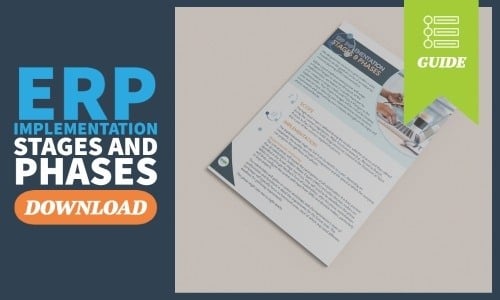5 Ways to Guarantee ERP Implementation Failure
- Updated on December 31, 2024
- Michael LaBorde
- Approx. Read Time: 4 minutes read
- Published on December 16, 2015


As financial processes become more complex and intertwined at growing firms, enterprise resource planning (ERP) systems become must-haves. Accounting, reporting and the disparate solutions used to handle them will effectively lead to an ERP implementation failure unless a proper implementation strategy is leveraged once the company reaches a certain size.
Implementing an ERP is easier said than done, though, and plenty of firms fail to realize the full potential of their financial systems. In the worst cases, enterprises scrap their systems a year or more after purchase, swallowing the costs and moving on to other vendors. But even for companies that do see their implementations through, poor planning often leads to faulty or inadequate reporting, a lack of visibility and low levels of control throughout the life of the ERP.
Many firms make the same mistakes, and a little due diligence and guidance can go a long way in preventing common problems. Following are the top five ways to guarantee an ERP implementation failure. Avoid these pitfalls, and you’ll be well on your way to a successful implementation.
All too often, executives underestimate the effort and involvement in ERP system implementation and project management. The most comprehensive systems involve warehousing, sales, customer service, accounting and almost every other operational department. To implement them properly, you need to involve everyone who’s going to touch the system – now and in the future.
No individual or department understands all aspects of your business, and failing to involve every group of users will inevitably lead to hassles later on. You’ll configure your ERP according to an assumed set of workflows and processes, and the people who actually have to carry out those processes will be left to fend with a clunky, inefficient system that may even feel worse than the previous solution.
You hire outside help or dedicated personnel for accounting, payroll and most other financial functions. Your ERP implementation should be no different. Far too many firms underestimate the time the process will take, and they assign time-consuming tasks to current full-time employees. For rapidly growing companies, the use of existing personnel for configuration, data importation and manipulation only prolongs and hamstrings the process. All the while, the ERP vendor may be charging you for the software license, server space or both. In the long run, it’s far more efficient to outsource the implementation.
Do you know what functions your firm really needs? ERPs run the gamut from turnkey to customized, and picking the wrong product will lead to lost time and unnecessary expenses. Some enterprises need the functionality afforded by SAP or Oracle, while that level of customizability is a burden to others. Flexibility is great if you have the time and money for custom app development, but simpler solutions still work well for smaller firms. That said, it’s better to err on the side of more flexibility than less. A rigid system that doesn’t meet your needs will lead to buyer’s remorse, and its shortcomings will more than offset its lower costs.
In the same vein, it’s critical to understand your data requirements before you begin an implementation. “Garbage in, garbage out” rings true for ERPs and lead to many an ERP implementation failure. Unclean data will lead to faulty reports and unreliable forecasts – not to mention scrutiny from auditors. Whether you’re importing all of your transactional data or just last year’s balances, you need someone with a strong accounting background to do it.
The business world has gotten a lot more comfortable with the cloud, but some companies still automatically opt for on-site solutions over software as a service (SaaS). Given the massive savings SaaS solutions have to offer, this is a major mistake. With no additional servers, no hardware maintenance and an entire team dedicated to keeping your ERP up and running, cloud costs are typically far lower, particularly in the short-run. Plus, SaaS solutions are spread out over multiple servers and may be even more secure than on-premise platforms. Not every enterprise needs to move to the cloud, but dismissing it outright could lead to unsustainable and unplanned expenses.
Last but certainly not least, a lack of buy-in is one of the easiest ways for an ERP implementation to fail. The process may take several months to complete, but you’ll ideally conduct user tests and generate sample reports within the first few months. From the management accountant to the CFO, everyone who will use the system needs to see firsthand that it’s going to make their lives easier. Likewise, executives and board members need to see that the ERP can turn raw data into actionable information. Without their buy-in during the early stages of the implementation, users can become detractors, rather than supporters, and it’s possible that they won’t allocate enough resources to see it through to the end.
To learn more how an 8020 consultant can help your firm implement an ERP, please contact us. You can also learn more about stages and phases of ERP implementation projects in our free guide:

Michael joined 8020 Consulting in 2014 as a Senior Consultant, executing projects that included leading several system implementations, conducting due diligence support (acquisition), building financial models for analysis and budgeting and serving as Interim CFO and Controller. Prior to joining 8020 Consulting, Michael obtained diverse financial and operational leadership experience including positions as CFO and VP of Operations of several rapidly growing companies in technology (hardware and software), e-commerce and business services. As CFO, some of his more significant accomplishments include upgrades to reporting, financial analysis, budgeting and ERP and other Financial systems, providing leadership and other stakeholders with crucial information and allowing the respective companies to continue to grow sustainably. Michael is a CPA and holds a B.S. in Accounting from Indiana University Northwest and an MBA from the Kellogg School of Management at Northwestern University.
Organizations increasingly use audit management systems (AMS) to ...
Read MoreAuditing plays a vital role in ensuring compliance, managing risk, ...
Read MoreManaging compliance and security is increasingly complex, especially ...
Read More